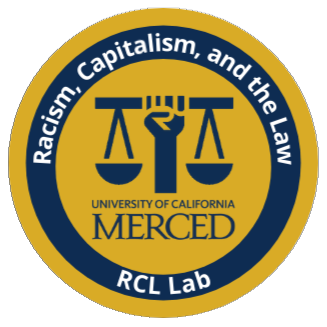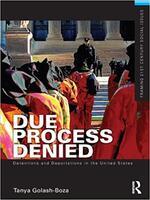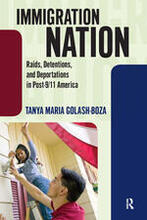Publications by Year: 2012
2012
Due process protections are among the most important Constitutional protections in the United States, yet they do not apply to non-citizens facing detention and deportation. Due Process Denied describes the consequences of this lack of due process through the stories of deportees and detainees. People who have lived nearly all of their lives in the United States have been detained and deported for minor crimes, without regard for constitutional limits on disproportionate punishment. The court’s insistence that deportation is not punishment does not align with the experiences of deportees. For many, deportation is one of the worst imaginable punishments.
Immigration Nation provides a critical analysis of the impact that U.S. immigration policy has on human rights. In the wake of 9/11, the Department of Homeland Security was founded to protect America from the threat of terrorist attacks. However, along with dramatic increases in immigration law enforcement raids, detentions, and deportations have increased six-fold in the past decade American citizens, families, and communities have ultimately borne the cost. Although family reunification is officially a core component of U.S. immigration policy, these same policies often tear families apart. Pundits and politicians nearly always frame this debate in terms of security and economic needs, but here, Tanya Maria Golash-Boza addresses the debate with the human rights of migrants and their families at the center of her analyses.
In this essay, I consider what a sociology without borders would look like through an exploration of two questions: 1) How can sociology be mobilized to make the world a better place? and 2) What does a sociology of human rights look like? To answer these questions, I take the reader through a discussion of the history of Sociologists without Borders, the influence of Professor Judith Blau, and my own excursions into the sociology of human rights in the United States and abroad.
Human rights declarations provide the right for any person to leave their country, yet do not provide the right to enter another country, stopping halfway in asserting a right to mobility. In this article we provide evidence that 1) state policies and actions create migration flows; 2) migrants often travel to fulfil their human rights; and 3) current restrictions on immigration curtail migrants’ human rights. We argue, based on sociological evidence, that the right to mobility is a fundamental human right, and deserves a place in human rights doctrine.
Due process protections are among the most important Constitutional protections in the United States, yet they do not apply to non-citizens facing detention and deportation. Due Process Denied describes the consequences of this lack of due process through the stories of deportees and detainees. People who have lived nearly all of their lives in the United States have been detained and deported for minor crimes, without regard for constitutional limits on disproportionate punishment. The court’s insistence that deportation is not punishment does not align with the experiences of deportees. For many, deportation is one of the worst imaginable punishments.
In the wake of September 11, 2001, the Department of Homeland Security (DHS) was created to prevent terrorist attacks in the US.This led to dramatic increases in immigration law enforcement - raids, detentions and deportations have increased six-fold. Immigration Nation critically analyses the human rights impact of this tightening of US immigration policy. Golash-Boza reveals that it has had consequences not just for immigrants, but for citizens, families and communities. She shows that even though family reunification is officially a core component of US immigration policy, it has often torn families apart. This is a critical and revealing look at the real life - frequently devastating - impact of immigration policy in a security conscious world.



